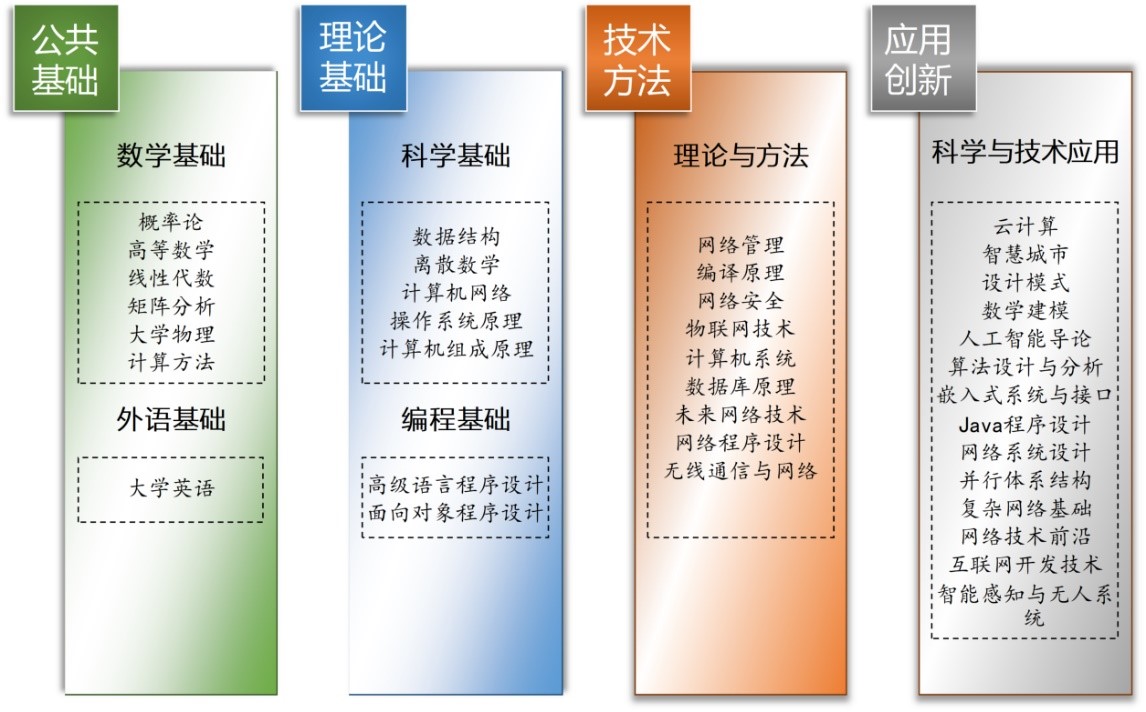
1.Background
The Network Engineering Department was founded in 2004. Based on the national strategy of "network power" and the "Internet +", the major focuses on computer networks combined with researches including the design, development, application and management of network system. The major targets to build compound talents with solid foundation, outstanding technology and innovative thinking. This major was selected into the "Hubei Province's Strategic Emerging Pillar Industry Plan" in 2011. In 2012, it was approved as the first batch of pilot projects for comprehensive reform of undergraduate majors in Hubei Province. In the “2015 China University and Discipline Professional Evaluation Report”, this major ranked 10th among 291 universities in the country and was listed as one of the best 7 5-star-major of the university.
2.Objectives
This major focuses on both computer science and network communication knowledge, emphasizes the practice training and innovative talent training. It is guided by national strategic needs, to meet the needs of enterprise informatization, networking and intelligence, focusing on the overall improvement of basic knowledge, research and development capabilities, and comprehensive quality. Professionally-trained students can meet the innovative needs of innovative countries in the field of computer science and networking, with a solid foundation of knowledge, strong engineering practice, organizational skills, and an international perspective. Graduates can engage in research, design, development, engineering application, management and maintenance of computer networks and systems in the information industry and other national economic sectors, and can also continue to pursue master's and doctoral degrees.
3.Requirements
Students in this major are required to master the public basic knowledge of engineering. Based on a deep understanding and mastery of computer science and technology, they are required to focus on the basic principles and key technologies of network engineering, the principles of computer networks, network management technologies, and network system development technologies. With systematic comprehensive and in-depth study and practice, they are required to master the ability to engage in computer network and system research, network engineering planning design and implementation, network system management and maintenance, and network system security assurance.
4.Courses:
Major Disciplines: Computer Science and Technology, Information and Communication Engineering, Electronic science and technology
Main Courses: Compiler Principle, Network Programming, Database Principle, Network Management, Future Network Technology, Wireless Communication and Wireless Network, Network Security, Internet of Things Technology, Computer Architecture
Lab Experiments: Advanced Language Programming Course Experiment, Object Oriented Programming Course Experiment, Networking Programming Course Experiment, Database Principle Course Experiment, Network Management Course Experiment, Future Network Technology Course Experiment, Wireless Communication and Wireless Network Course Experiment, Internet of Things Technology Course Experiment
Practical Work: Advanced Language Programming Course Projects, Object Oriented Programming Course Projects, Data Structure Course Projects, Principles of Computer Composition Course Projects, Principles of Operating System Course Projects, Integrated Practice of Algorithm, Networking Programming Project, Database Principle Course Projects, Network Management Course Projects, Future Network Technology Course Projects, Wireless Communication and Wireless Network Course Projects, Network Security Course Projects, Internet of Things Technology Course Projects, Comprehensive Practice of Network

Figure 1 The subject foundation ( platform ) courses

Figure 2 The ability construction of network engineering practice course

Figure 3 Training modes of network engineering talents
5.Faculty and Talent Training
There are 10 full-time faculties in the Department of Network Engineering, including 3 professors, 2 Ph.D. supervisors, and 1 “Chu Tian Xue Zi” from Hubei "Chu Tian Scholars Program." Faculties are all master supervisors, all have Ph.D. degrees and all have long been engaged in computer network or Internet of Things theoretical research, engineering project development and application.
They have published more than 100 SCI / EI academic papers in the past 5 years, and undertaken more than 20 national, provincial and ministerial scientific research and teaching projects.
The school has a number of professional experimental platforms such as future network technology, sensors, network storage and security, Internet of Things engineering, and network engineering. It also has a Ministry of Education "Resource Environment Internet of Things" college students' off-campus practical education base and five independent education bases, which provide a solid foundation for the cultivation of students' professional ability.
6.Career Prospects
The network engineering major has always ensured stability and high quality in students' employment. In the past four years, the employment rate of graduates has reached nearly 100%, and about 40% of graduates are studying for graduate studies or studying abroad. The employment scope of graduates of this major includes Tencent, Baidu, Alibaba, Huawei, Lenovo, Ruijie, H3C, Guazi and other well-known Internet and information technology companies, with an average annual salary of about 120,000. The salary level of graduates has maintained growth for years and is at the forefront. Among all the undergraduate majors in our school, the average starting salary is the highest, and the employment rate, the employment professional counterparts and other indicators have been among the top quality majors for many years.

Figure 5 Employment direction of network engineering major in recent years (parts)